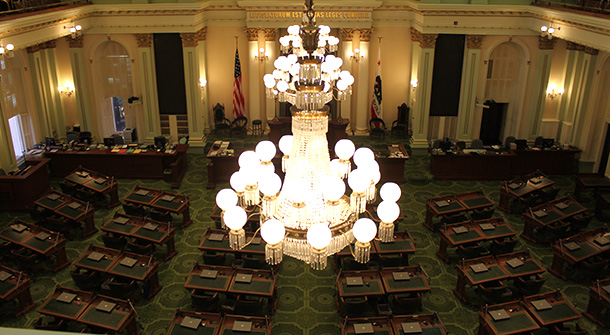
(Photo Credit: Ben Franske/Wikimedia)
When California voters overwhelmingly backed a 2016 ballot measure to boost transparency in lawmaking, the intent was clear: to prevent last-minute bill changes done in the dark. Under the new rules, how well the Legislature is complying is getting some serious scrutiny.
The timing of some votes by the California Assembly generated some heat from advocates of Proposition 54, which altered the state's constitution in order to give the public a better view of legislation before their representatives vote on them.
Also known as the California Legislative Transparency Act, the law requires the Legislature to distribute and post legislation online and in its final form for at least 72 hours before a final floor vote by either house.
“The public’s ability to thoroughly review proposed laws and participate in the legislative process in a meaningful way was enhanced considerably by Prop 54,” said Jim Mayer, president and CEO of CA Fwd. “Adhering to the new rules represents a big test in the restoration of the public's trust in government.”
Earlier this year, an important milestone and promising development occurred when the Legislature passed the first major piece of legislation under the new rules, a $5.2 billion-a-year transportation funding package.
CA Fwd gave the Legislature kudos, not only for accountability measures built into the new package, but for complying with the 72-hour-in-print rule, a commonsense solution to help prevent last-second, hidden deals and promote a more open, honest and accountable government:
“And it moved through the Legislature while giving the public time to understand and weigh in without last-minute changes to its language behind closed doors. In other words, Prop 54 works—and on the biggest stage imaginable.”
Lawmakers themselves also benefit from having more time to re-read and consider amended bills they are being asked to vote on in a short period of time.
Then came a recent deadline for bills to be voted on in their house of origin and…38 bills were amended and voted on by the Assembly less than 72 hours after they were published. Proponents of the Prop 54 soon sent a letter to the Governor and Senate ProTem Kevin de León regarding the discrepancy.
The debate has centered on what “final form” means, with the Assembly arguing the transparency rules only apply to the vote by the second house to pass a bill, rather than the final vote in each house.
Last year, when voters approved Prop 54, they were telling the Legislature that an open and accountable process was not only expected but should be built into the California Constitution. CA Fwd, after advocating for the 72-hour-in-print rule for years, noted that the approval by voters was “another good step in the direction of making sure how government functions is worthy of all of us.”
By quibbling with the language, the debate also unnecessarily hands opponents of legislation a legal opening to attack their passage as unconstitutional. Additionally, the Senate was able to comply with the spirit of the law and waited at least 72 hours to vote on amended bills.
Fortunately, the schedule for the Legislature to approve a budget plan is on track to comply with the in-print rules, according to CA Fwd Senior Fiscal Analyst Fred Silva. The budget bill was in print on Saturday, well ahead of the June 15 deadline for a final budget. And if the Legislature votes on June 15 on the as-published budget plan, that puts them well within compliance of the 72-hour rule.
Most of the so-called “budget trailer” bills are also in print and available for review. The trailer bills, which include statutory changes required by provisions in the budget, will be taken up in house budget committees this week and likely on the floor of each house on June 15. They are not subject to the June 15 budget deadline and will likely be enacted before July 1, 2017.
For more than 10 years, CA Fwd has prioritized rebuilding trust in government and promoting accountability as primary goals in an incremental process to improve how California is governed. Prop 54 was just one step in that journey and moved us toward legislative proceedings that are conducted more openly and fairly.
CA Fwd encourages both houses to respect the will of voters and more effectively follow the plain and commonsense intent of the law, as captured in the ballot argument in favor of Prop 54 presented to voters last year:
“Require every bill to be posted online and distributed to lawmakers at least 72 hours before each house of the Legislature is permitted to vote on it.”

